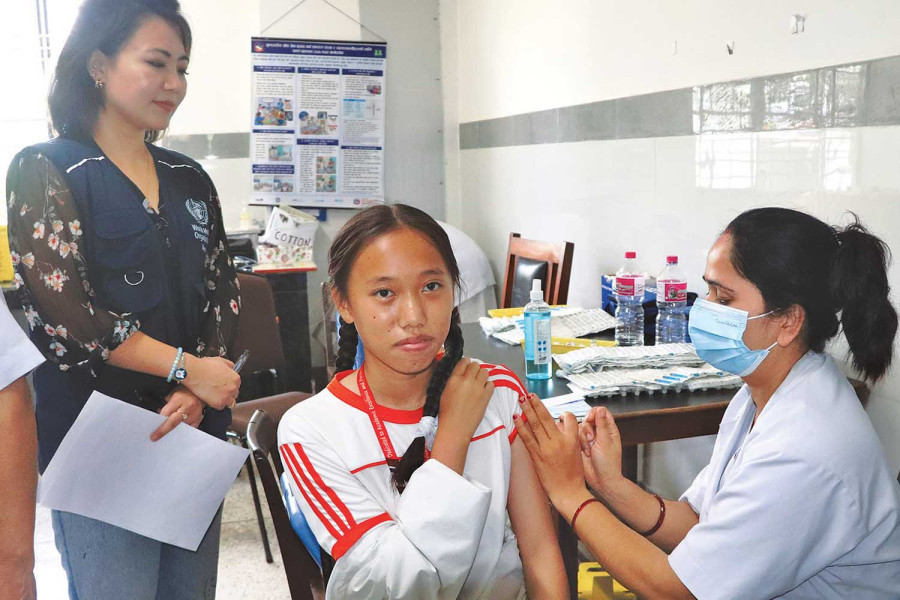Health
Health authorities fail to track over 1,500 girls who missed second HPV vaccine dose
The government, in its new policies and programmes, has committed to administering the HPV vaccine to all eligible girls in the new fiscal year.
Post Report
Health authorities have failed to locate the whereabouts of over 1,500 girls who were jabbed with the human papillomavirus (HPV) vaccine once but did not show up for a second dose.
Officials at the Ministry of Health and Population said that health agencies in all seven provinces have been making phone calls and requesting them to come for a second dose of the vaccine.
“Hundreds of girls aged between 14 and 15 years did not show up for the second dose of HPV vaccine, as they were preparing for secondary education examinations (SEE),” said Dr Abhiyan Gautam, chief of the Immunisation Section at the Family Welfare Division under the Department of Health Services. “After they completed the exam, some returned to their homes and others to cities for further studies.”
The health ministry’s data shows 9,980 girls between 14 and 15 years of age from the seven provinces were jabbed with the first dose of the HPV vaccine in a pilot programme launched in September last year. Those who were administered the first dose were supposed to take the second dose of vaccine in six months.
Health authorities first launched the second dose vaccination in federal hospitals in all the provinces, but due to a low uptake, they sent vaccinators to schools. The vaccination programme was suspended later after vaccinators failed to track the girls who were administered the first dose.
Officials hoped that girls would seek a second dose of the vaccine after completing the SEE examination, but that too did not happen.
Human papillomavirus is a viral infection that spreads through skin contact. The virus causes cervical cancer, which is the second most common cancer in the developing world and a major cause of death among Nepali women. Hundreds of women get diagnosed with cervical cancer every year in Nepal.
According to the BP Koirala Memorial Cancer Hospital in Bharatpur, more than 700 women suffering from cervical cancer seek treatment at the hospital every year.
Doctors say most cervical cancer cases are associated with HPV, a sexually transmitted infection and that widespread immunisation could reduce the impact of cervical and other cancers caused by the HPV worldwide.
Countries like Bhutan, Sri Lanka, Thailand and the Maldives have introduced the HPV vaccine nationally, while India and Indonesia have introduced it in some districts.
In 2016, Nepal piloted HPV vaccination in Chitwan and Kaski districts. All girls aged between 11 and 13 years were then given two doses of the vaccine.
Experts say early treatment prevents up to 80 percent of cervical cancer.
HPV vaccination was also included in the government’s policies and programmes for the next fiscal year 2024-25, which is a repetition of the past several years. Health ministry officials, who used to claim that HPV vaccination would be available to all eligible girls in 2022, said a nationwide HPV vaccination drive is likely in 2025 only.
The ministry plans to inoculate around 1.7 million girls between 10 and 14 years with the HPV vaccine through nationwide drives and also make it part of regular immunisation.
According to officials, the Global Alliance for Vaccine and Immunisation (GAVI) has agreed to provide HPV vaccine doses. Once the campaign is completed, the vaccine will be included in the government’s routine immunisation programme.
Nepal submitted a proposal to GAVI in July last year requesting free HPV doses so that the vaccine could be included on the regular immunisation list. Ministry officials say they have proposed a budget for nationwide HPV vaccination campaigns in 2025.
Officials say that GAVI has already agreed to provide required vaccine doses, but the problem is their availability.
The World Health Organisation says HPV vaccination is recommended as part of a coordinated strategy to prevent cervical cancer and other diseases caused by the virus.
The UN health body says HPV is responsible for more than 70 percent of cervical cancer cases in women. Countries that have included the HPV vaccine in their regular immunisation list have successfully reduced cervical cancer cases in women, according to doctors.




 14.12°C Kathmandu
14.12°C Kathmandu














